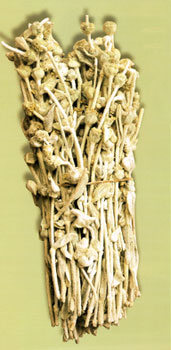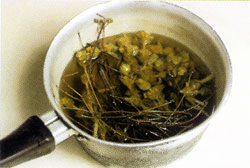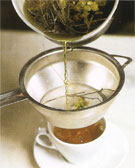|
|
|
Greek Mountain Tea
 Greek
mountain tea can be found in almost every
Greek household. When the weather
turns cooler and the first signs of an
impending cold or cough manifest themselves,
when the limbs aches, or when you just feel
under the weather, a tea made from the dried
stalks of Sideritis cretica has
beneficial and curative effect. The
twigs are broken into pieces, which are then
put into a pan of boiling water. They
are left over a low heat for at least five
minutes to infuse rather than to simmer, and
then strained straight into cups. The
addition of cinnamon sticks enhances the
flavor still further. The Greek ironwort is a medium-high shrub that has an
upright form, with opposing, wooly leaves
growing on straight, relatively
non-branching stalks. The plant
manages to survive on sites with hot, dry
summers. Its small, yellow flowers are
rather unobtrusive. The botanical name
Sideritis, derived from the Greek
word sideros, meaning iron,
indicates this plant's areas of application
in ancient medicine. It was used
externally for its anti-inflammatory and
astringent properties in the case of "wounds
from iron struck into limbs," and internally
for its ability to strengthen the body's
powers of resistance. When the
Venetians discovered the tea, they called it
malotira because it "draws out the
illness." Greek
mountain tea can be found in almost every
Greek household. When the weather
turns cooler and the first signs of an
impending cold or cough manifest themselves,
when the limbs aches, or when you just feel
under the weather, a tea made from the dried
stalks of Sideritis cretica has
beneficial and curative effect. The
twigs are broken into pieces, which are then
put into a pan of boiling water. They
are left over a low heat for at least five
minutes to infuse rather than to simmer, and
then strained straight into cups. The
addition of cinnamon sticks enhances the
flavor still further. The Greek ironwort is a medium-high shrub that has an
upright form, with opposing, wooly leaves
growing on straight, relatively
non-branching stalks. The plant
manages to survive on sites with hot, dry
summers. Its small, yellow flowers are
rather unobtrusive. The botanical name
Sideritis, derived from the Greek
word sideros, meaning iron,
indicates this plant's areas of application
in ancient medicine. It was used
externally for its anti-inflammatory and
astringent properties in the case of "wounds
from iron struck into limbs," and internally
for its ability to strengthen the body's
powers of resistance. When the
Venetians discovered the tea, they called it
malotira because it "draws out the
illness."
This special variety of ironwort, Sideritis
cretica, thrives in the highlands of Greece
and is considered particularly effective and
aromatic among mountain tea connoisseurs
 |
 |
Break
the stalks into pieces. Pour
over boiling water, cover, and
quickly bring to a boil. Leave
to infuse to the desired strenght,
then strain into cups. |
|
excerpts from:
"Culinaria Greece"
|
|
Copyright ©2001 - 2008
GreekCuisine.com. All rights reserved.
GreekCuisine.com is part of the
GoGreece.com network
2665 30th Street Suite 214, Santa Monica, CA 90405 USA
|